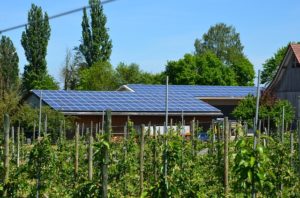A solar battery provides backup power to your home. If your area has a power outage, or if your home doesn’t receive consistent sunshine through the seasons, a battery can provide stability and comfort to your home. However, most home solar installations don’t actually need a solar battery. Furthermore, batteries add more costs to solar installations and maintenance.
So why would you need solar battery power? If you are in a remote location, a location with less sunshine, or your home is off-grid, batteries could be an essential investment. Our solar battery guide will break down the pros and cons for you.
- Why Would You Need Solar Battery Backup Power?
- Solar Battery Guide to Cost
- Solar Battery Guide to Capacity
Why Would You Need Solar Battery Backup Power?
The majority of homes with solar power are grid-tied. That means their homes can draw power from the grid of the town or city, if need be. Grid power can act as a fallback in case solar power isn’t meeting the full energy needs of a home, in case of an equipment malfunction or simply a cloudy day.
However, some homeowners need solar battery power for their homes. What if your home is in a location that won’t receive consistent sunshine, either due to the position of your house or the weather in your region? Then the addition of a battery to your system could be a good idea.
 Even if your home is grid-tied, a battery will help you avoid fluctuations in power. You may also want to avoid drawing power from the grid, keeping your energy bills low and your carbon footprint minimal. A solar battery can maximize the sunshine you get by storing all that solar power for a cloudy day. It’s a great option if your home doesn’t get a ton of sun.
Even if your home is grid-tied, a battery will help you avoid fluctuations in power. You may also want to avoid drawing power from the grid, keeping your energy bills low and your carbon footprint minimal. A solar battery can maximize the sunshine you get by storing all that solar power for a cloudy day. It’s a great option if your home doesn’t get a ton of sun.
If your home is off-grid, though, then a battery becomes very important. Without access to a power grid, your household’s power is vulnerable and may need that backup power provided by a solar battery. One key takeaway from this solar battery guide: solar batteries can serve as a home’s safety net.
(To better understand these different systems, it may be helpful to review our solar power guide.)
Solar Battery Guide to Cost
Of course, that stability and comfort comes at additional cost. The U.S. Department of Energy has reported that an average battery system is between $380 and $895 per kWh.[1]U.S. Office of Energy Efficiency & Renewable Energy Many households will use around 30 kWh per day.[2]U.S. Energy Information Administration Those kWh add up to a big price tag for any homeowner seeking enough capacity to run their solar off their battery for more than a few hours. New developments in solar technology are predicted to make these solar battery systems more affordable for consumers in the future. At the moment, however, due to this added cost solar installers typically only recommend battery systems for two scenarios: off-grid homes, or grid-tied homes that frequently see power outages.
Solar Battery Guide to Capacity
 If you do, in fact, need solar battery backup power, you’ll need to know two key metrics for solar batteries: capacity and power rating. Capacity is how much power a battery stores. Power rating is how much power the battery can convey at once. Batteries with low power ratings will only let their power flow out a little bit at a time.
If you do, in fact, need solar battery backup power, you’ll need to know two key metrics for solar batteries: capacity and power rating. Capacity is how much power a battery stores. Power rating is how much power the battery can convey at once. Batteries with low power ratings will only let their power flow out a little bit at a time.
In some cases, a homeowner may only need battery power for a few key appliances, like a freezer and fridge, during an outage. In that case, a battery with a lower power rating but a large capacity works as a failsafe. It can offer a slow but consistent flow of power for those critical appliances for days up to a week.
You might find that solar installation professionals use the term “stackable.” This refers to a trend of designing battery systems that will “stack” batteries of different types, sizes, and capacities. This stacking can offer maximum coverage and protection for your home solar.
How would you use a stackable system? You could still have that “failsafe” battery we described to power essential appliances for several days. But that could be paired with a second battery with a high power rating that provides enough juice to power your entire house for just a few hours or a day. If your area’s power grid is relatively unstable, or you get unpredictable weather, then a stackable system could be well worth the expense.
(Illustration: Solar Power by ic2icon from the Noun Project)
References
